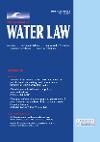The Journal of Water Law - Volume 26 - Issue 4

ARTICLES
‘Waters of the United States’: nearly 50 years of jurisdictional uncertainty, and more to come
RICHARD M. GLICK, OLIVIER F. JAMIN
Davis Wright Tremaine LLP
With the enactment in 1972 of the Clean Water Act (‘the CWA’), the United States embarked on a mission to ‘restore and maintain the chemical, physical, and biological integrity of the Nation’s waters’. The Act was a reaction to spectacular reports of highly contaminated waterways. It established a regulatory programme over ‘waters of the United States’, an undefined term. Over the following decades, the reach of federal jurisdiction has been the subject of ongoing debate and controversy. Throughout this article, the authors aim to provide a measure of clarity to this confusing regulatory programme.
China’s international water law policy: some reflections
FOZIA NAZIR LONE
Associate Professor, School of Law,
City University of Hong Kong
China is the world’s biggest ‘exporter’ of transboundary water, as all ten of Asia’s largest river systems originate from the Tibetan Plateau. This paper uses an interdisciplinary approach to review Chinese municipal water law, considers domestic pressures regarding water management, examines international water agreements, and discusses the potential for greater Chinese cooperation with regards to transboundary water issues. The Chinese approach to water disputes has historically prioritized territorial boundaries and the importance of sovereign water rights, however the rise of China as a world power and its efforts to improve its international image is reshaping the Chinese mindset towards better transboundary water cooperation. This paper argues that current evidence points away from a pending China-led ‘water war’ and instead towards more good neighbour policies and increased international cooperation.
Changing notions of sovereignty and governance of water in India: an analysis of the Inter-state Water Disputes Tribunal
AMRISHA PANDEY
PhD candidate in School of Law, University of Leeds, UK
SURYA P. SUBEDI
Professor of international law in School of Law, University of Leeds, UK The Constitution of India has distributed the powers to govern water resource and legislate between the centre and the federal states. Since the Constitution provides only a framework for sharing and management of water between such states and adjudication of disputes, a great deal of efforts has been made since the independence of India to flesh out the provisions of the Constitution and to implement its provisions. However, these endeavours have remained inadequate giving rise to disputes at the provincial level as well as between two and more than two federal units and consequent politicisation of disputes. This article intends to look beyond the proportional distribution of water among various stakeholders or between riparian states, and therefore competence of the Inter-state Water Dispute Tribunal is investigated to point out its limitations in resolution of the inter-state water disputes.
CASE COMMENTARIES
US litigation and regulation: selected issues
AMERICAN COLLEGE OF ENVIRONMENTAL LAWYERS
“A Hard Rains A-Gonna Fall” – Utility-Scale Solar Projects Creating Significant Stormwater Issues
MARK R. SUSSMAN
Modern Day Alchemy: New Help for Treating Acid Mine Drainage
ROBERT URAM
Marine licensing in marine conservation zones
JASON LOWTHER, JOANNE SELLICK
School of Law, Criminology and Government, University of Plymouth
